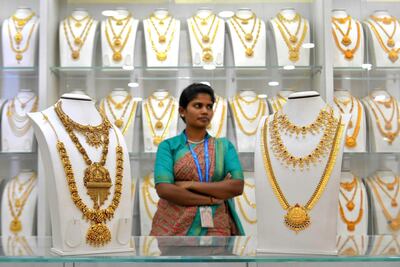Anil Jain, a jewellery shop owner in one of Mumbai's biggest gold markets, is worried about his business after the government recently raised the import tax on the precious metal.
"The import duty is a big blow and we expect business to go down by another 25 to 30 per cent because of it," says Mr Jain, whose shop is in the bustling Zhaveri Bazaar in India's financial capital alongside dozens of similar stores.
"We think there will be big momentum in smuggling of gold now, so the trade will go into the wrong hands," he adds.
In a surprise move, India's annual budget, unveiled by prime minister Narendra Modi's government this month, hiked the duty on gold imports to 12.5 per cent from 10 per cent even as the nation's demand for the yellow metal was taking a hit from higher prices.
Gold prices have risen to above $1,400 an ounce this year as investors turned to haven assets, as volatility continued in the oil market and Brexit and trade conflicts added to concerns about a weakening global economic outlook.
The US Federal Reserve’s dovish stance and expectations of interest rate cuts have also supported gold prices in recent weeks. The higher levy in India, the world’s second-largest consumer of the metal after China, adds to the price of gold in the domestic market.
“The import duty hike on gold will negatively impact India’s gold industry,” says Somasundaram PR, the managing director for India at the World Gold Council. “This will impede efforts to make gold as an asset class, particularly when gold prices are already rising globally. In addition, the grey market will thrive, which will dilute efforts to reduce cash transactions.”
Demand for gold jewellery totalled 598 tonnes in India last year, down slightly from 601.9 tonnes in 2017, according to the World Gold Council data. Gold carries great importance in Indian culture and tradition, being the centrepiece in weddings and religious festivals, and the precious metal is often used as a means of storing household savings.
But the Indian government is keen to reduce the country’s gold purchases because the vast majority of the precious metal has to be imported – a major burden on India’s current account deficit. Mr Modi’s government is also concerned that gold can be used as a means of storing illegal wealth.
In 2013, India raised taxes on gold three times in an effort to control its current account deficit. But high taxes on gold have led to a rise in smuggling. Up to 120 tonnes of gold was brought into India illegally in 2016, according to the World Gold Council. Reports in the Indian media of thwarted attempts to smuggle gold into the country via air and sea are frequent, and there are many cases that go undetected.
Industry insiders widely describe the tax hike in the budget as “disappointing”, explaining that the sector has struggled to recover from the impact of demonetisation, when the two highest-denomination banknotes were banned in November 2016, followed by the introduction of a new goods and services tax the following year. There had been widespread expectations in the sector that, if anything, the import tax would be reduced to bring some relief.
“The gem and jewellery industry is going through very tough times with a decline in exports and job losses and the industry expected some positive announcement as encouragement to our sector,” says Pramod Kumar Agrawal, chairman of an Indian trade body the Gem and Jewellery Export Promotion Council.
Industry members say the higher duty, which makes gold bought through legal channels more expensive, only further incentivises people to smuggle gold into the country to avoid paying the higher rates.
“Genuine and law-abiding businessmen will be affected,” says Anantha Padmanaban, the chairman of the All India Gem and Jewellery Domestic Council, an industry group, explaining that it is seeking an “immediate rollback and further reduction in the import duty on gold”.
The World Gold Council says that slower economic growth in India could also weigh on consumer demand for the precious metal in the near-term. India’s gross domestic production growth ground to a five-year low of 5.8 per cent in the first three months of this year, official figures show.
“We estimate that the recent announcement of a 2.5 per cent increase to gold’s import duty by the Indian ministry of finance may result in a reduction to 2019 demand of approximately 2.4 per cent,” the council said in a research note. The organisation adds that “if the higher levy was to become permanent, it could reduce long-term Indian consumer demand by slightly less than 1 per cent per year”.
Mukesh Kumar, a member of the council’s market intelligence group, wrote in a blog post that “we think [the tax hike] may be a temporary measure [and] when the government’s books are in better shape we may see some of these tax increases rolled back”.
Mr Kumar explains that the duty hike was part of a broader plan by the government to generate much-needed revenues for its coffers.
Some analysts say that even if gold prices are high, Indians are unlikely to dramatically lose their appetite for the yellow metal because of how deeply rooted demand for it is in India.
“I think the demand per se on an annual basis will not go down dramatically,” says Naveen Mathur, the director of commodities and currencies at Anand Rathi Shares and Stockbrokers, in Mumbai.
Many households, particularly in rural areas, prefer to store their savings by purchasing physical gold, rather than putting their money into banks.
Gold is considered an “idle” asset in terms of its role in the economy. Consequently, the government has made efforts to bring demand for the precious metal into the formal financial system in recent years, through the launch of a sovereign gold bonds scheme launched in 2017, for example.
“It’s a transition for India to move from the physical gold to gold as financial instruments because largely the rural population is still invested in physical gold,” says Mr Mathur. “For them, that’s the only channel for them to have any asset or save money. They’re still not inclined towards equities and so on. There’s still a long way to go.”
Sachin Kothari, the director at Augmont, a precious metal management company and digital gold platform in India, explains that gold as a formal financial investment is still popular.
“At an India level, where the consumption of gold is concerned, obviously demand has taken a hit,” he says. “But as far as the investment demand is concerned, people are regularly investing in gold. It’s considered a safe haven and it has a natural edge against inflation. It acts as a diversification for investors’ portfolios.”
He adds that he also wants the duty on gold to come down to discourage smuggling and give a boost to the sector.
Back in the Zhaveri Bazaar gold market in Mumbai, Mr Jain says he and some other jewellers plan to lobby the government to reconsider the duty hike. They are particularly worried because the festive season, which begins next month, is a peak time for gold purchases in the country.
Mr Jain fears the latest move could even put some jewellers and goldsmiths out of business.
"Why will people buy gold in India now, when they can buy it at cheaper prices abroad?" he says.
"We're anticipating a big slump."


